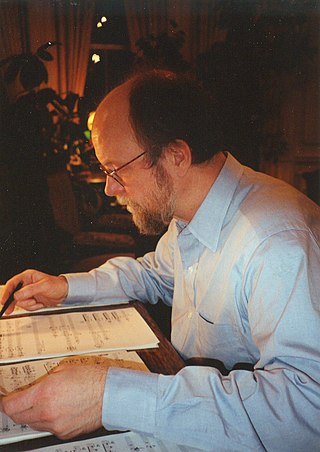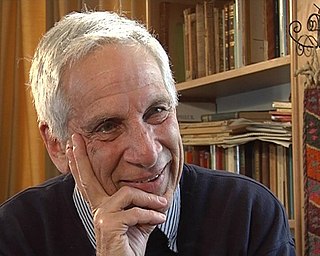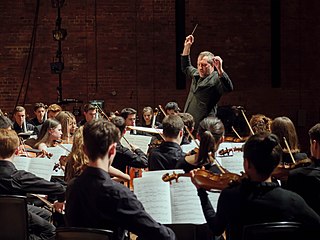
Stuart Oliver Knussen was a British composer of contemporary classical music and conductor. Among the most influential British composers of his generation, his relatively few compositions are "rooted in 20th-century modernism, [but] beholden to no school but his own"

Charles Peter Wuorinen was an American composer of contemporary classical music based in New York City. He also performed as a pianist and conductor. Wuorinen composed more than 270 works: orchestral music, chamber music, solo instrumental and vocal works, and operas, such as Brokeback Mountain. His work was termed serialist but he came to disparage that idea as meaningless. Time's Encomium, his only purely electronic piece, received the Pulitzer Prize. Wuorinen taught at several institutions, including Columbia University, Rutgers University and the Manhattan School of Music.

Robert Gerhard i Ottenwaelder was a Spanish and British composer, musical scholar, and writer, generally known outside his native region of Catalonia as Roberto Gerhard.

Peter Alexander Goehr is an English composer and academic.

Thomas Joseph Edmund Adès is a British composer, pianist and conductor. Five compositions by Adès received votes in the 2017 Classic Voice poll of the greatest works of art music since 2000: The Tempest (2004), Violin Concerto (2005), Tevot (2007), In Seven Days (2008), and Polaris (2010).
Julian Anderson is a British composer and teacher of composition.
John Roger Smalley was an Anglo-Australian composer, pianist and conductor. Professor Smalley was a senior honorary research fellow at the School of Music, University of Western Australia in Perth and honorary research associate at the University of Sydney.

Geoffrey King is a British composer and teacher.
Hugh Wood was a British composer.
Hilda Paredes is one of Mexico's leading contemporary composers, and has received many prestigious awards for her work. She currently resides in London, and is married to the noted English violinist, Irvine Arditti.

Matthew King is a British composer, pianist, and educator. His works include opera, piano and chamber music, and choral and orchestral pieces. He has been described by Judith Weir, Master of the Queen’s Music, as “one of Britain's most adventurous composers, utterly skilled, imaginative, and resourceful."
Huw Thomas Watkins is a British composer and pianist. Born in South Wales, he studied piano and composition at Chetham's School of Music in Manchester, where he received piano lessons from Peter Lawson. He then went on to read music at King's College, Cambridge, where he studied composition with Robin Holloway and Alexander Goehr, and completed an MMus in composition at the Royal College of Music, where he studied with Julian Anderson. Huw Watkins was awarded the Constant and Kit Lambert Junior Fellowship at the Royal College of Music, where he used to teach composition. He is currently Honorary Research Fellow at the Royal College of Music.
Nicholas Sackman is an English classical composer.
Michael Rosenzweig, born 1951 in Cape Town, South Africa, is a composer, conductor, choral trainer and director, multi-instrumentalist and jazz musician.
Odaline de la Martinez is a Cuban-American composer and conductor, currently residing in the UK. She is the artistic director of Lontano, a London-based contemporary music ensemble which she co-founded in 1976 with New Zealander flautist Ingrid Culliford, and was the first woman to conduct at the BBC Promenade Concerts in 1984. As well as frequent appearances as a guest conductor with leading orchestras throughout Great Britain, including all the BBC orchestras, she has conducted several leading ensembles around the world, including the Ensemble 2e2m in Paris; the New Zealand Symphony Orchestra; the Australian Youth Orchestra; the OFUNAM and the Camerata of the Americas in Mexico; and the Vancouver Chamber Orchestra. She is also known as a broadcaster for BBC Radio and Television and has recorded extensively for several labels.
Jorge Villavicencio Grossmann (1973) is a Peruvian composer, naturalized Brazilian, who currently resides in the United States.

Clelia Iruzun is a Brazilian pianist based in London.
Adjustable Wrench, sometimes also The Adjustable Wrench, is a composition for mixed chamber ensemble by American composer Michael Torke. It was composed in 1987.
Stephen Lawrence Pruslin was an American pianist and librettist who relocated to London in the 1970s to work with Peter Maxwell Davies and Harrison Birtwistle.
David Ellis was an English composer, arranger and music producer at the BBC.







